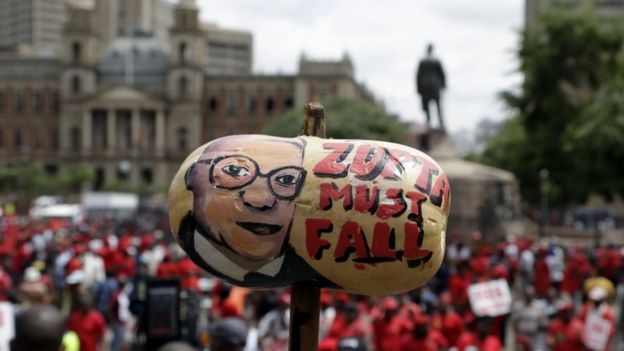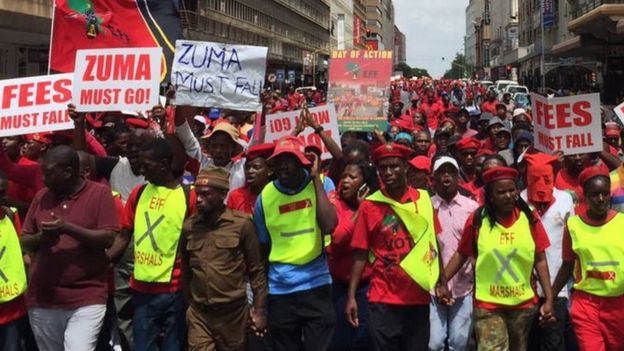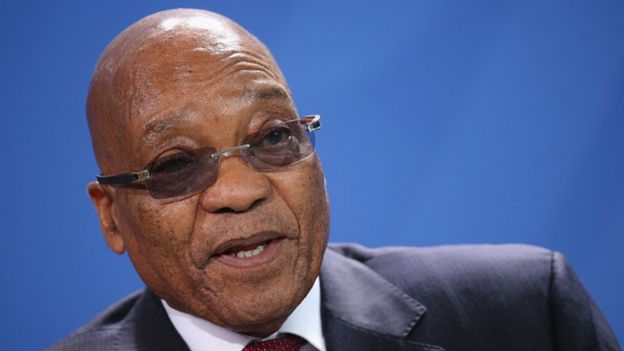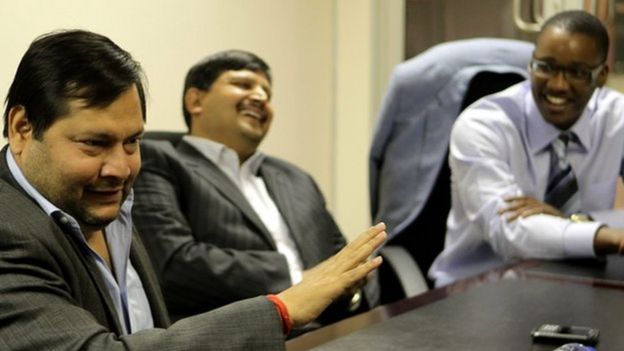The findings of an investigation into corruption allegations against South Africa's President Jacob Zuma have been released.
In the report, former Public Protector Thuli Madonsela recommends Mr Zuma should establish a judicial commission of inquiry with 30 days.
The ANC leader is accused of an improper relationship with wealthy businessmen.
Mr Zuma had tried to block the release of the report.
But he dropped his court bid on Wednesday, with his office releasing a statement revealing the decision was made "in the interest of justice and speedy resolution of the matter".
"The president will give consideration to the contents of the report in order to ascertain whether it should be a subject of a court challenge," the statement added.
- Africa Live: Updates from anti-Zuma march
- The Guptas and their links to Zuma
- South Africa's corruption crusader
Thousands of people gathered in the capital Pretoria and in other cities on Wednesday ahead of the report's publication, demanding his resignation. Police fired water cannon to disperse protesters.
The protesters, supporters of the Economic Freedom Fighters (EFF) party, had gathered outside Mr Zuma's main administrative offices in Pretoria.
Opposition groups are also rallying in South Africa's other major cities.
The president has been dogged by corruption allegations for more than a decade, but has repeatedly denied any wrongdoing.
 AP
AP
Ms Madonsela investigated allegations that he let the wealthy Gupta family wield undue influence in his government.
The Guptas were accused of trying to nominate cabinet ministers in exchange for business favours.
Both Mr Zuma and the Gupta family have denied the allegation.
Mr Zuma's bid to block the report's release was challenged by opposition parties, which are now demanding that he pays their legal costs.
Thousands of opposition supporters have been rallying in Pretoria, shouting "Zuma must fall".
Democratic Alliance (DA) leader Musi Maimane said state coffers were being "plundered" by "crooks", but the "good guys" were winning in the battle to safeguard the democracy which emerged in South Africa at the end of minority rule in 1994.
"This is about letting Zuma, the Guptas and all their useful idiots know that their days are numbered," Mr Maimane said.
Final straw for Zuma?: Pumza Fihlani, BBC News, Pretoria
 AFP
AFP
President Zuma's move was unexpected but it has been welcomed. So why the U-turn?
"He's acknowledging that he has no grounds to prevent the release of the Report on State Capture," said constitutional expert Lawson Naidoo.
For many South Africans who have harboured doubts about whether Mr Zuma should stay in power, his close relationship with the wealthy Gupta family is the final straw.
Although all concerned have denied any wrongdoing, many feel Mr Zuma can no longer be trusted to act in the best interests of the country and its hard-fought constitution.
This is why thousands of people from various opposition parties marched through the streets of Pretoria, calling for Mr Zuma to go.
It is not clear what Mr Zuma's next move is, but he is under pressure from all sides, even many in the governing African National Congress (ANC).
As for South Africans, they say the time of sitting idly by is over - they are fighting back.
Ms Madonsela's investigation was triggered by allegations in March by Deputy Finance Minister Mcebisi Jonas that the Gupta family had made "a mockery of our hard-earned democracy" by offering him the finance minister's post last year.
Mr Jonas said he rejected the offer; the Guptas denied the allegation and accused him of political point-scoring.
Former ANC MP Vytjie Mentor also alleged that the family offered her the powerful public enterprise minister's post in 2010 in exchange for business favours.
Ms Mentor alleged that Mr Zuma was in another part of the Guptas' family home in Johannesburg when the offer was made. Mr Zuma's office said at the time that he had no "recollection" of Ms Mentor, while the family strongly denied her allegation.
The Guptas in South Africa:
 GALLO IMAGES
GALLO IMAGES- Ajay, Atul and Rajesh Gupta moved to South Africa from India in 1993
- Set up businesses in air travel, mining, energy, technology and media
- Opposition nicknamed them and the president as "Zuptas" because of their close relationship
- Deny influencing ministerial appointments to advance their business interests
- Accused of being involved in "suspicious" transactions worth about $490m (£400m)
- Say they are withdrawing from their South African businesses because of political backlash
- Big banks have refused to do business with them
Ms Madonsela had planned to release the report last month, before the end of her seven-year term as South Africa's public protector.
The investigation is her second into Mr Zuma since he took office in 2009.
In March, South Africa's highest court upheld her earlier findings that Mr Zuma "unduly benefited" from government money used to upgrade his private rural home.
It led to widespread calls for Mr Zuma to resign, but he survived an impeachment vote in parliament after ANC MPs rallied behind him.
Correspondents say that Mr Zuma will almost certainly face another impeachment vote if there are any adverse findings about him in the latest report.
The president is also at the centre of another case and is trying to overturn a unanimous ruling of a High Court that he should stand trial on 783 counts of corruption in relation to an arms deal negotiated in 1999.
Mr Zuma's term as president is due to end in 2019.






0 comments:
Post a Comment